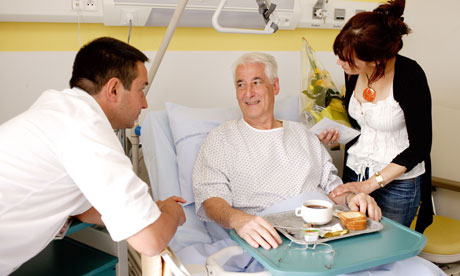
Your relative goes into hospital. "Phew", you might think, "they'll get the care they need". Or maybe not, according to the Care Quality Commission's latest inspection of NHS wards that found elderly patients waiting hours for drinks and often not getting help to eat. At the Royal College of Nursing, chief executive, Peter Carter, has a plan to improve the inpatient care of the elderly. He said last week that relatives of elderly patients should be encouraged to help care for them. While they shouldn't do nursing tasks, he said, they could help at meal times – and he suggested hospitals extend visiting times. Many hospitals restrict visiting to afternoons.
A recent report from Age Concern said that over 175 000 people enter hospital already malnourished and that over 185 000 leave it malnourished. Being malnourished increases your chance of getting an infection and of dying. There have also been numerous reports of elderly people being treated in undignified ways – such as sitting in their own urine. Then there is the risk of medication errors and someone writing "do not resuscitate" in their notes without asking.
The dilemma?
So should you just move on to the ward to keep your elderly family member safe – at least during visiting hours? Or ask the matron or sister on the ward if you can help out at meal times? Patients feel more settled if their relatives help to care for them. In Spain the family is expected to contribute to the nursing of their loved ones. But many of us have jobs and some of us are so exhausted by caring for our elderly relative that we'd like a break. So how can you best help?
The solution
Be visible early on. Talk to the nurse in charge of the ward and make an appointment to see the consultant in charge of your relative's care. Some hospitals have taken Age Concern's recommendations on how to reduce malnutrition in hospital and have protocols – weighing patients when they come in, assessing them and assigning them red trays to indicate that they need help with eating.
If your relative is lucid, ask them what they have eaten (and if they were helped to eat with a knife and fork – not, repeat not, with their fingers), what they would like you to bring in to eat (check with the nurses) and what they have drunk. Ask if they are thirsty (you can also test their skin for elasticity – pinch it gently into a fold, and it should spring back into place – but that might hurt, and is not always a good test on older people as their skin lacks elasticity). Help them to drink using a straw or beaker – and leave the drink where they can get it. Ask if they are passing urine. If they have trouble drinking, tell the nurses. Ask the nurses if they screen for malnutrition and what protocols they have to help patients who can't feed themselves. Some hospitals have trained volunteers to help at mealtimes. Make sure that hand-washing goes on – before anyone touches your relative (and that includes you).
When you talk to your relative's doctor (they should make sure that your relative has given consent for this), ask what the plans are for tests and treatment. Ask to go through their drug chart and make notes so you can ask questions later (your relative's GP might help with any queries).
Your relative would probably like to see as much of you as possible. But the nursing staff might not feel the same way. A survey in the Nursing Times carried out in Derby Hospital on over 220 patients, 20 visitors and 432 nurses found that patients and visitors wanted open visiting with a quiet hour for rest. Nurses wanted set visiting times. About 95% of nurses thought visitors stayed too long, compared with less than a third of patients.

